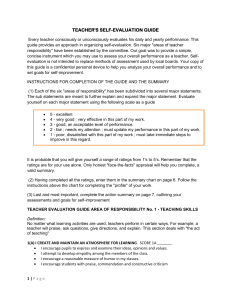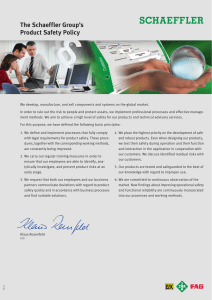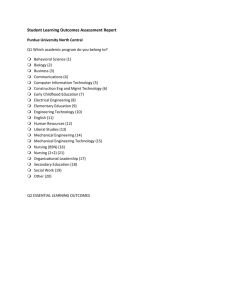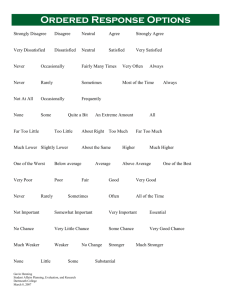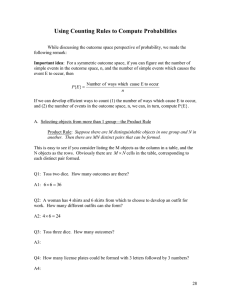TEACHER'S SELF-EVALUATION GUIDE Every teacher consciously or unconsciously evaluates his daily and
advertisement
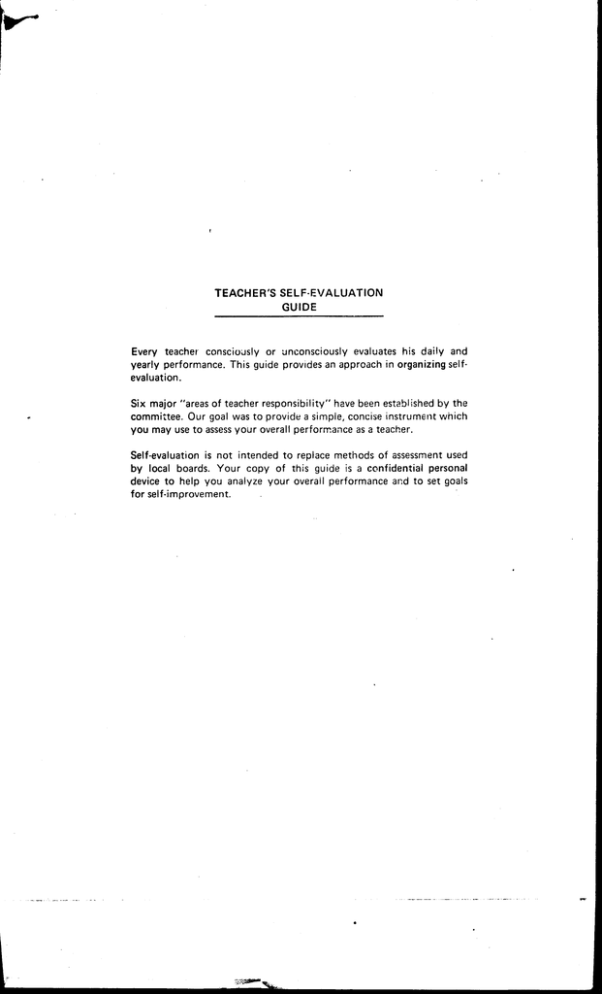
TEACHER'S SELF-EVALUATION GUIDE Every teacher consciously or unconsciously evaluates his daily and yearly performance . This guide provides an approach in organizing selfevaluation . Six major "areas of teacher responsibility" have been established by the committee . Our goal was to provide a simple, concise instrument which you may use to assess your overall performance as a teacher . Self-evaluation is not intended to replace methods of assessment used by local boards . Your copy of this guide is a confidential personal device to help you analyze your overall performance and to set goals for self-improvement . . INSTRUCTIONS FOR COMPLETION OF THE GUIDE AND THE SUMMARY (1) Each of the six "areas of responsibility" has been subdivided into several major statements. The substatements are meant to further explain and expand the major statement . Evaluate yourself on each major statement using the following scale as a guide. 5 - excellent 4 - very good ; very effective in this part of my work . 3 - good; an acceptable level of performance . 2 - fair; needs my attention ; must update my performance in this part of my work. 1 - poor; dissatisfied with this part of my work ; must take immediate steps to improve in this regard. It is probable that you will give yourself a range of ratings from 1's to 5's . Remember that the rati. ngs are for your use alone. Only honest "face-the-facts" appraisal will help you complet, a valid summary . (2) Having completed all the ratings, enter them in the summary chart on page 8. Follow the instructions above the chart for completing the "profile" of your work . (3) Last and most important, complete the action summary on page 9, outlining your assessments and goals for self-improvement . TEACHER EVALUATION GUIDE AREA OF RESPONSIBILITY No . 1 - TEACHING SKILLS Definition; No matter what learning activities are used, teachers perform in certain ways. For example, a teacher will praise, ask questions, give directions, and explain . This section deals with "the act of teaching" 1(A) I CREATE AND MAINTAIN AN ATMOSPHERE FOR LEARNING . I I I I 1(B) encourage pupils to express and examine their ideas, opinions and values . attempt to develop empathy among the members of the class . encourage a reasonable measure of humour in my classes . encourage students with praise, commendation and constructive criticism . I PROVIDE A MOTIVATIONAL ENVIRONMENT FOR MY STUDENTS. I approach my lessons and the class with enthusiasm . I am conscious that certain aspects of teacher performance such as drama and tonality of voice affect student motivation . I make use of desirable digressions and discussions on topics of student interest and current events . I encourage students to develop the attitude that a job worth doing is worth doing well . 1(C) I endeavour to invoive every pupil in the activity of each class . I avoid excessive "teacher-talk" . 1C I USE EFFECTIVE QUESTIONING TECHNIQUES. I seldom have to interpret my questions or give additional information in order to elicit satisfactory responses . The type of questions I ask require students to use a variety of cognitive processes in answering . I use methods that effectively spread questions throughout the class . I accept answers in such a way as to encourage further student participation . 1(E) 1B I MAINTAIN A JUDICIOUS BALANCE BETWEEN TEACHER-CENTERED AND PUPIL-CENTERED ACTIVITIES . - 1(D) 1A 1D I USE TECHNIQUES THAT MAKE CLEAR THE PURPOSE AND CONTENT OF EACH LESSON . I use summaries, reviews and overviews to ensure that students are able to place units in perspective . I emphasize clearly the important points in a lesson . I ensure that an adequate summary is made at the end of each class or unit of work . 5 4 3 2 1 - excellent very good ; very effective in this part of my work. good ; an acceptable level of performance . fair; needs my attention ; must update my performance in this part of my work . poor; dissatisfied with this part of my work ; rpust take immediate steps to improve in this regard . 1E AREA OF RESPONSIBILITY No. 2 - TEACHING STRATEGIES Definition, Teachers, independent of their individual skills and personalities, use varied methods to achieve the objectives of their program . This section deals with the strategies employed in effective teaching . 2(A) I USE VARIED AND EFFECI IVE METHODS OF PRESENTATION APPROPRIATE TO THE LESSON CONTENT . In planning my lessons, consideration is given to relating my strategy to the objectives of the lesson . I make use of Socratic questioning, group discussions, laboratory techniques, panels, demonstrations, lectures, role playing, team teaching, independent study, debates and simulation games where suitable . I use audio visual aids and illustrative materials where available and appropriate . 2(B) 213 I EVALUATE EFFECTIVELY, THEREBY IMPROVING BOTH TEACHING AND LEARNING . I use student achievement as one measure of my teaching effectivenr,-s. Tests are used for both diagnosis of student problems and evaluation of their progress. The evaluation methods which I use place emphasis on the growth of the individual toward specific goals and objectives. The results of evaluation are used to determine the suitability of my objectives in planning further instruction . My testing procedures are constantly modified and improved . At the end of the year, I give students an opportunity to evaluate the program by means of constructive criticism . 2(D) F~ I PROVIDE WRITTEN AND ORAL ASSIGNMENTS REQUIRING ANALYTICAL AND CRITICAL THINKING . I recognize the necessity to individualize assignments. I use assignment sheets and programmed learning materials when and where appropriate . 1 use problem solving techniques where appropriate . My assignments require students to comprehend ideas, apply these ideas, analyze, synthesize and evaluate information rather than simply memorize and reproduce facts. 2(C) 2A 2C F-1 2D F-I I UTILIZE COMMUNITY RESOURCES TO ENRICH THE CLASSROOM PROGRAM . I invite, as guests of the school, members of the community who have expertise and/or special experience . I make use of the environment of the school or area to enrich the regular classroom program, always ensuring that the objectives of each field trip have been clearly formulated and are understood. 5 4 3 2 1 - excellent very good ; very effective in this part of my work . good ; an acceptable level of performance . fair; needs my attention ; must update my oe-formance in this part of my work . poor; dissatisfied with this part of my work; must take immediate steps to impruve in this regard . AREA OF RESPONSIBILITY No. 3 - CLASSROOM MANAGEMENT Definition; The effective teacher devclc;;s methods of dealing vrith disriplinarr and administrative matters which will maximize the learning situation . 3(A) MY CLASSROOM PROCEDURES ARE DESIGNED TO DEVELOP A POSITIVE LEARNING ENVIRONMENT . Each student is aware of the standards of behaviour I expect to be followed in my classroom . I encourage each student to develop self-discipline . My disciplinary procedures are based on respect for the rights of others . I avoid destructive criticism, ridicule and sarcasm and minimize the use of fear as a motivator . I set and maintain a high standard of decent and courteous language. 3(B) I HAVE AN EFFECTIVE METHOD FOR DEALING WITH CLERICAL MATTERS . 3A In addition to procedures outlined by the school or department, I have developed effective methods for distributing instructional materials and for recording student attendance and marks . I keep accurate records of administrative matters and am prompt in replying to office requests. I use school equipment in such a way as to give full consideration to other staff members. 5 4 3 2 1 -~- excellent very good ; very effective in this part of my work. goad ; ,~n ;:;-cup~ab:e level of performzim;e . fair ; needs my attention ; must update my performance in this part of my work. poor ; dissatisfied with this part of my work ;must take immediate steps to improve in this regard . r_ j AREA OF RESPONSI?ILiTY No. 4 - SUBJECT COMPETENCE AND PROFESSIONAL GROWTH Definition; The teacher enters the profession with a certified academic or vocational background. He grows professionally when he takes advantage of opportunities to improve his knowledge and instructional qualifications . 4(A) I STRIVE TO UPGRADE MY PROFESSIONAL COMPETENCE . Within the past year I have participated in activities designed to improve myself and the educational system, such as additional university courses, subject councils, workshop, federation offices and committees . I attempt to broaden my perspective through professional study, research, reading, writing, travel, and try to enrich my teaching through the experience gained . 4(B) 4B F-1 4C F~ I TAKE AN ACTIVE PART IN CONTINUING CURRICULUM DEVELOPMENT . I have attained a working knowledge of the new H .S. 1 format . Through discussions with colleagues and through reading professional literature I am aware of curriculum innovations in my subject area. I have been involved in the planning and updating of courses of study in my subject .area . I evaluate the effectiveness of the courses of study that I teach with a sensitivity for student interest and relevance to the modern scene. 4(D) F] I MAKE USE OF AVAILABLE MEANS OF EVALUATION TO IMPROVE MY TEACHING . I am receptive to the suggestions of my colleagues. I take part in intervisitation programs with a view to exchanging ideas. 4(C) 4A I RECOGNIZE THE MAJOR OBJECTIVES TO BE ACHIEVED IN MY SUBJECT AREA AND WORK TOWARDS THEIR ATTAINMENT . I have participated in staff and department discussions regarding philosophy and objectives . I have established objectives for each course that I teach and they are consistent with the overall objectives of the department . I question critically the methods, procedures and materials employed in terms of their value in achieving the objectives of the program . 5 4 3 2 1 - excellent very coed ; very effective in this part of my work . good ; ar, acceptable level of performance . fair; needs my attention ; must update my performance in this part of my work . poor ; dissatisfied with this part of my work ; must take immediate steps to improve in this regard . 4D AREA OF RESPONSIBILITY No. 5 - INTERPERSONAL RELATIONSHIPS with students, staff & other adults Definition; Through his daily interpersonai relationships the teacher has a unique opportunity to help young people develop and mature through his example and direction . In addition, he can be a positive influence on other staff members and can establish valuable contacts with the parents and other concerned adults in the community. 5(A) I AM CONSISTENTLY FAIR AND IMPARTIAL WITH STUDENTS . I respect the dignity of each young person . I respect the students' point of view even though I may disagree with it. I criticize in a discreet and private manner, concentrating on correcting the improper behaviour . I try to ensure that any rewards and punishments used are appropriate to the situation . 5(13) I RECOGNIZE MY RESPONSIBILITIES IN HELPING STUDENTS TO MATURE SOCIALLY AND TO ACHIEVE SELF-REALIZATION . I try to build self-confidence in each student. I provide support and encouragement when students experience disappointment and failure . I make it clear that I am concerned with habits, attitudes and values . I try to understand the special needs and interests of each of my students . I try to be "APPROACHABLE" : a person who is available with a sympathetic ear when needed . 5(C) F 5C F 5D F-1 1 TRY TO PROMOTE A POSITIVE CLIMATE IN THE SCHOOL . I make a genuine effort to meet and help new staff members . I participate in staff, social and recreational activities. I am discreet in discussing problems of a personal nature regarding students and staff . 1 smile at all staff members once a week, even if it hurts! 5(E) 5B I RECOGNIZE THAT MY ATTITUDE AND EFFICiENCY IN MY WORK HAS AN EFFECT ON OTHER STAFF MEMBERS . I share school equipment, facilities and ideas willingly . I am considerate of the workload and feelings of secretarial, custodial and paraprofessional staff . I conscientiously avoid action which could inconvenience others, such as detaining students at the conclusion of a class and giving inadequate notice of field trips . 5(D) 5A I MAKE USE OF MY CONTACTS WITH PARENTS AND OTHER CONCERNED ADULTS TO PROMOTE CONFIDENCE AND GOODWILL TOWARDS THE SCHOOL PROGRAM AND STAFF . I notify parents well in advance of student out-of-school activities . I recognize the inter-dependence of the school and the parents in child development, and ensure that parents are informed of situations requiring special attention . In my public statements I present rry school and the teaching profession in a positive light . 5 4 3 2 1 - ex(,-. -=qt ver. :od; very effective in this part of my work. goc ~ acceptable level of performance fair : ; ~_, ,ds my attention ; must update my performance in this part of my work . poop ; dissatisfied with this part of my work ; must take immediate steps to improve in this regard . 5E AREA OF RESPONSIBILITY No. 6 - CONTRIBUTION TO THE TOTAL SCHOOL EFFORT Definition; It has been said that the "tone" of a school is affected by the attitudes and action of each teacher "above and beyond the call of duty". This section deals with these extras required of the teacher beyond his classroom work. 6(A) IN ADDITION TO MY REGULAR DUTIES AS A CLASSROOM TEACHER I ACCEPT WILLINGLY EXTRA DUTIES WITHIN THE SCHOOL . I participate in committee work in the school such as commencement committee, assembly committees . My colleagues know by my attitude that I am prepared to assist whenever necessary . I make my time and talents available beyond the classroom helping students through extra academic assistance, coaching or managing of teams, clubs or other activities . 6(B) MY CONCERN FOR MY STUDENTS EXTENDS BEYOND THE TEACHERPUPIL RELATIONSHIP . I encourage the students to take action to improve the school environment, to respect the school property and that of others . In all contacts with students in the halls, on the playing-field or wherever, I encourage goodwill towards the school . I show concern for the total welfare of my students rather than achievement in a particular subject . I take corrective action outside of my classroom when necessary . 6(C) 6A 6B I ACCEPT ADMINISTRATIVE DECISIONS IN GOOD FAITH AND MAKE USE OF THE PROPER CHANNELS TO SUGGEST MODIFICATIONS TO THOSE DECISIONS WITH WHICH I DISAGREE . I discourage harmful gossip and chronic complaining in the staff room . I support the policies of the school and ensure that my students understand and adhere to these policies . I bring student reaction to school policy to the attention of the administration, and suggest modification where applicable . 5 - excellent 4 - very good ; very effective in this part of my work. - good ; ,, n a:!:centable !evel of performance . 2 - fair; needs my attention ; must update my performance in this part of my work . 1 - poor ; dissatisfied with this part of my work; must take immediate steps to improve in this regard . 6C F1 SUMMARY CHART By reading through this guide you have been reviewing the many facets that go together to produce good teaching . You have also evaluated your own performance in each of the areas of responsibility . This is but the first step; the procedures below are designed to help you make a valuable summary which will help you to focus on areas of strength and areas needing improvement . (1) Enter your self-ratings in the appropriate spaces in the chart below. (2) Add up the total and average scores for each area as indicated . (3) Compare your average score for the six areas, and also note the individual scores which are particularly high or low . Then complete the "Action Summary" on Page 9 . Area of Responsibility No. 1 Teaching Skills Self-Rating 1A 1B 1C 1D 1E No. 2 Teaching Strategies 2A 2B 2C 2D No. 3 ' Classroom Management 3A No. 4 Professionai Growth 4A 4B 4C 4D No. 5 Interpersonal Relationships 5A 5B 5C 50 5E No. 6 Total School Effort 6A 6B 6C _ Total Score in This Area Average Score in This Area ACTION SUMMARY More important than whereare you now is what you plan to do to improve yourself in the areas that you, as a professional, believe are in need of improvement . Now fill out items 1, 2, 3 and 4 below . (1) Aspects of my work being carried o ut wel! . (2) Those aspects being conducted on a less desirable level . (3) Specific areas in need of improvement . (4) My goals for self-improvement for the coming ye ar. (Outline in detail what you intend to do, how you will go about it, what help you will seek to do it, etc .) We hope that by reviewing the many factors that we believe contribute to good teaching, you have benefited as a professional teacher. It is also our hope that now the students with whom you work will benefit from your renewed awareness. Having completed this personal evaluation, we would encourage you to participate in an evaluation of the program in your subject area using the second part of this kit.
